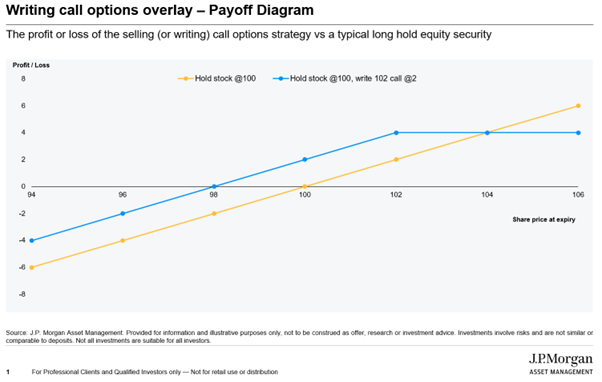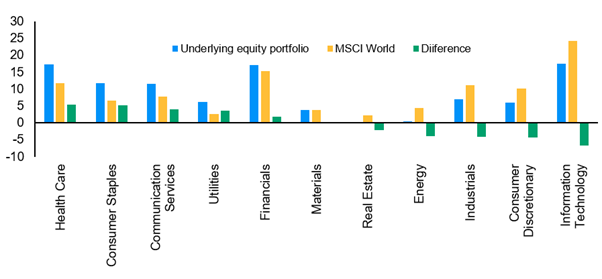The strategy purpose-built for the current market volatility
Given the market volatility right now, there would be a lot of investors who would probably be willing to give up some potential upside, to reduce downside and generate a more consistent income.
If only there was a product that existed to do just that.
Fortunately, the boffins at J.P. Morgan have already created it via the JPMorgan Global Equity Premium Income Complex ETF (ASX: JEGA), which was recently launched on the ASX.
Whilst the timing is serendipitous, it’s also a pertinent reminder that anything can happen in markets and investors will always do well to identify their objectives and then invest in opportunities and products that best meet them.
In the following Q&A, I unpack JEGA with the man responsible for the strategy, Hamilton Reiner – Managing Director and CIO of U.S. Core at J.P. Morgan Asset Management.
What is a premium income strategy and what is JEGA aiming to deliver for clients?
According to Reiner, JEGA is purpose-built to strike a balance between yield, capital growth, and risk by using equities and options.
“We use fundamental bottom-up research to build a higher-quality, lower-beta portfolio of global large cap equities with lower volatility” says Reiner.
“We then sell index call options against the exposure of the long-only global equity portfolio and use the premiums to generate income, in addition to the dividends from the underlying equities we hold”.
The result, according to Reiner, is a conservative equity income strategy designed to reduce downside exposure by forgoing some upside participation.
Why is the strategy benchmarked against the MSCI World Minimum Volatility Index?
The fact that the MSCI World Index captures large and mid-cap representation across 23 Developed Markets (DM) countries, with around 1,465 constituents, was a big reason for its choice as the benchmark, according to Reiner.
“The index covers approximately 85% of the free float-adjusted market capitalisation in each country. We believe the MSCI World Index is a broad measure of global equities as a comparator for the strategy,” says Reiner.
He adds that whilst the official benchmark is the MSCI World Index, “we decided to use minimum volatility underlying equity portfolio (with around 0.7 beta to the overall market) for the strategy because option overwriting strategies can at times be criticised for capping the upside while still taking on market-like downside and we wanted to avoid that”.
This underlying equity portfolio solves for a lower volatility experience. Coupled with the options overlay strategy, it acts as a barbell approach with its underlying defensiveness and higher volatility/favourability from options.
Can you explain the use of options, for someone who might not be familiar with them?
To understand the use of options, Reiner points out that it’s important to understand the sources of return;
- Dividends from the underlying equity portfolio
- Option premiums from selling out-of-the-money index call options
- The potential for some capital appreciation
“The Strategy combines a portfolio of companies with strong fundamentals coupled with disciplined equity index options overlay to enhance distributable income with lower risk over the long term.
"It starts with a research-enhanced, high-quality, defensive underlying equity portfolio,” says Reiner.
Regarding the use of options specifically, Reiner adds, “through the sale of equity-index call options, the Strategy aims to capture premiums while retaining the potential for capital appreciation. This approach allows investors to benefit from regular income streams without significantly altering the underlying risk-return profile of the portfolio.”
The keys to the options strategy are consistency and discipline, with the portfolio management team seeking “to continually sell (write) 1-month 30 delta out-of-money S&P 500 Index and MSCI EAFE call options, on a rolling weekly basis”.
“It is important to note that the JEGA strategy is selling call options which means that the underlying portfolio is 100% fully invested at all times. The premium collected from the selling (writing) of such index call options (and dividend income) is paid out on a monthly basis” says Reiner.
The chart below showcases how selling (writing) call options functions in contrast to a normal equity security. For avoidance of doubt on how selling (writing) call options work, the Strategy (as the seller of the option) receives premiums from the purchaser of the option in exchange for providing the purchaser with the right to buy a certain amount of exposure to the performance of the underlying equity index from the strategy at a specific price, known as the exercise or strike price, during a specified period of time.
If the value of the index underlying the option is less than the strike price, the option will generally not be exercised by the purchaser and the Strategy will earn the full premium on the expiration of the option, or a portion of the premium if the option is terminated early. By contrast if the value of the index underlying the option exceeds the strike price, the option will generally be exercised and the Strategy will have to pay the purchaser the difference between the value of the index and the strike price. In both scenarios, the Strategy earns the premium.

Portfolio positioning
According to Reiner, the Fund remains broadly region, sector and style neutral versus the benchmark.
“The Strategy is built on an approach where we seek to add incremental value by capitalising on mis-valuations in equity markets via a risk-controlled bias towards attractively ranked securities within regional sectors while minimising sector, region, and style risk”, says Reiner.
“Our portfolio is still more defensive with lower volatility relative to the broader benchmark MSCI World since it follows the MSCI World Minimum Volatility Index and has more exposure in defensive sectors such as consumer staples, healthcare, communication services, and utilities”.

Leaning into volatility
Market volatility has spiked aggressively recently, and there is the potential for the moves to work in favour of the strategy, as it could enhance the options premium.
As explained by Reiner, “options, on a high level, are priced based on the likelihood that the underlying asset will end up in-the-money or with intrinsic value.
Implied volatility is crucial in options pricing. If the underlying stock has a high implied volatility, this means that the stock's price could change drastically in a certain period of time compared to those with lower volatility.
This increases the probability of the option to be profitable at expiration to the purchaser. As a result, options written on higher volatility assets would be more expensive.
As sellers of these call options, we are then benefitting from higher options premium when there is higher volatility" says Reiner.
Whilst volatility can enhance returns as outlined above, it can also reduce volatility in the portfolio.
“Sale (writing) of call options reduces the volatility and beta of our equity portfolio as our short call positions will move in the opposite direction of our benchmark indices”, notes Reiner.
“We are using options to reduce the volatility and risk of the portfolio, we are not using them for leverage or additional return potential. The combination of the underlying equity portfolio and the selling (writing) of equity index options strategy has resulted in an overall portfolio of approximately 0.55-0.6 beta versus the MSCI World – a lower volatility experience compared to that of a long-only global equity portfolio”.
The final word
Whilst volatility has picked up recently and JEGA can provide some protection in falling markets, it is important to remember that “the strategy is designed to enhance distributable income comprised of dividends and option premium; in return for the option premium, you may forgo a portion of the market’s upside” note Reiner, adding that “income is a goal, not a target”.
Reiner adds that for investors who are looking to maintain their strategic asset allocation and get money off the side-lines and into equities, JEGA targets to achieve low beta equity exposure with high and consistent levels of income.
In summary, JEGA provides:
- Fully active, broadly diversified equity portfolio: Leverages 80+ research analysts and an over 30-year proprietary process to find attractive stocks across sectors.
- Innovative income: Targets to deliver 7-9% annual income paid out monthly via an alternative sources of income using a unique options strategy.
- 100% payouts: Distributes all monthly net income from dividends and options premium.
For more information on how JEGA can be used within a portfolio, please click here.

3 topics
1 stock mentioned
1 fund mentioned

